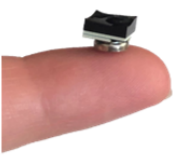I’ve finally had the chance to play Cyberpunk 2077 over the last few weekends, and it’s an amazing feat of graphics programming, especially with ray-tracing enabled. I’ve had fun, but I have been struck by how the cyberpunk vision of the future is rooted in the ’80s. Even though William Gibson was incredibly prescient in so many ways, the actual future we’re living in is increasingly diverging from the one he painted. One of the differences that struck me most was how cameras exist in the game’s world, compared to what I can see happening as an engineer working in the imaging field. They still primarily show up as security cameras, brick-sized devices that are attached to walls and would look familiar to someone from forty years ago.
A lot of people still share the expectation that cameras will be obvious, standalone components of a system. Even though phone cameras and webcams are smaller, they still have a noticeable physical presence, and often come with indicators like red lights that show when they’re recording. What is clear to me from my work is that these assumptions aren’t going to hold much longer. Soon imaging sensors will be so small, cheap, and energy efficient that they’ll be added to many more devices in our daily lives, and because they’re so tiny they won’t even be noticeable!
What am I basing this prediction on? The clearest indicator for me is that you can already buy devices like the Himax HM01B0 with an imaging sensor that’s less than 2mm by 2mm in size, low single-digit dollars in cost, and 2 milliwatts or less in power usage. Even more striking are the cameras that are emerging from research labs. At the TinyML Summit the University of Michigan presented a complete system that fits on the tip of a finger.

The video at the top of this post shows another project from Rice that is able to perform state of the art eye tracking at 253 FPS, using 23 milliwatts, in a lens-less system that lets it achieve a much smaller size than other solutions.
Hopefully this makes it clear that there’s a growing supply of these kinds of devices. Why do I think there will be enough demand to include them in appliances and other items around homes and offices? This is tricky to show as clearly because the applications aren’t deployed yet, but cameras can replace or augment lots of existing sensors, and enable entirely new features. Here are a few examples:
- Voice interfaces that use lip reading to improve accuracy in noisy situations.
- Stovetops that turn themselves off if they don’t see anyone nearby for a while.
- Water and other meters that share their data digitally with the cloud, without expensive replacements.
- A toaster that pops out the toast when smoke starts billowing.
- TVs that recognize when someone sits down, and who they are, to provide parental controls and personalized content.
- Shades that automatically close when nobody’s around, to conserve energy.
- Gesture recognition for controlling a lamp.
Each one of these may or may not turn out to be useful, but there are so many potential applications (including many I’m sure nobody’s thought of yet) that I can’t imagine some of them won’t take off once the technology is widely available. Many scientists believe that the Cambrian Explosion occurred because of the evolution of eyes opened up so many new possibilities and functions. I’m hoping we’ll see a similarly massive expansion in the technology space once all our devices can truly see and understand.
So, that’s why I believe we’re going to end up in a world where we’re each surrounded by thousands of cameras. What does that mean? As an engineer I’m excited, because we have the chance to make a positive impact on peoples’ lives. As a human being, I’m terrified because the potential for harm is so large, through unwanted tracking, recording of private moments, and the sharing of massive amounts of data with technology suppliers.
If you accept my argument about why we’re headed for a world full of tiny cameras watching us at all times, then I think we all have a responsibility to plan ahead now to mitigate the potential harms. This is my motivation behind the ML sensors proposal to wall off sensitive data in a secure component, but I see this as just a starting point in the discussion. Do we need regulation? Even if we don’t get it in the US, will Europe take the lead? Should there be voluntary standards around labeling products that contain cameras or microphones? I don’t know the answers, but I don’t think we have the luxury of waiting too long to figure them out, because if we don’t make any changes we’ll be deploying billions of poorly-secured devices into everybody’s lives as a giant uncontrolled experiment.
Pingback: Start Up No.1823: our ubiquitous camera future, America’s conspiracy politics, bad news about fuel prices, polio in London?, and more | The Overspill: when there's more that I want to say